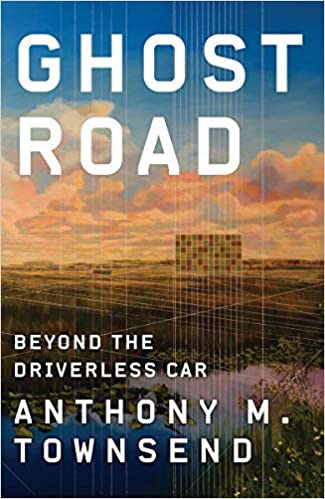You have /5 articles left.
Sign up for a free account or log in.
 Ghost Road: Beyond the Driverless Car by Anthony M. Townsend
Ghost Road: Beyond the Driverless Car by Anthony M. Townsend
Published in June 2020
Ghost Road is a relentlessly creative and deeply thought-through analysis of the future of transportation.
Having read and reviewed* several books about the driverless revolution, I had thought that I knew most what there is to know about the subject. Ghost Road revealed the limits of my understanding.
Townsend, an MIT-trained Ph.D. in urban and regional planning, sketches an alternative narrative around our autonomous transportation future. Rather than focusing his analysis solely on self-driving automobiles, Townsend widens the lens to consider all forms of mobility.
Townsend is one of the few experts on self-driving cars who can write authoritatively about urban design and public transportation. I had not quite realized how anti-public transportation many of the enthusiasts for autonomous vehicles (such as Elon Musk) are oriented. It is an urbanist take on autonomy that makes Ghost Road such a rewarding and edifying read.
Most of the conversation is about self-driving cars, but what about self-navigating (and -balancing) bikes and scooters? Townsend describes a scenario in which two-wheeled rental transportation replaces most short car trips. Bikes and scooters will be able to predict demand and autonomously relocate to where riders are concentrated. Townsend goes further than self-balancing e-bikes (which I find very cool) to describe a future in which services (dog grooming, etc.) autonomously come to consumers.
The most significant changes to come will not be in how we drive, but in how we consume. Autonomous vehicles will dramatically drive down the costs of shipping, in the process rewiring the supply chain. Townsend does not see the coming age of costless shipping as solely as a positive development, as he worries about the potential for monopolistic players such as Amazon to dominate markets and decimate competitors.
A fascinating section of Ghost Road is its description of the coming wave of small autonomous delivery vehicles, which he calls rovers. Ghost Road describes the Starship delivery robots from a company founded by the same Estonian team that created Skype.
The best way to experience the future of autonomous delivery vehicles on campus is to spend a few minutes watching this pre-pandemic video of a Purdue student getting a quesadilla delivered. (This student does a great job of making the video hilarious and informative.) In the age of campus social distancing, I'm picturing autonomous rovers swarming our campuses to deliver meals and library books and testing kits to residence hall-bound students.
How might have Ghost Road been written differently given the experience of COVID-19? One theme that runs through the book is that of America's deep reliance on automobiles for commuting to work. While telecommuting was growing quickly pre-pandemic, only 3.4 percent of all employees worked entirely remotely.
Today, seven out of 10 employees are working fully or partially remotely. We can only speculate on how COVID-19 will shift long-standing patterns and assumptions about remote work. However, it is a safe bet that a high proportion of all work in the future will continue to be done by remote workers.
If the norm of face-to-face work is indeed eroding, what will be the impact on transportation? Eliminating the need to drive to work may increase the appeal of transportation as a service. Summoning an autonomous electric vehicle for infrequent trips may make more sense than owning a car that sits mostly in the garage.
Ghost Road should be required reading for anyone thinking about the future of transportation, cities and exchange.
What are you reading?
* Reviews of books about self-driving cars:




